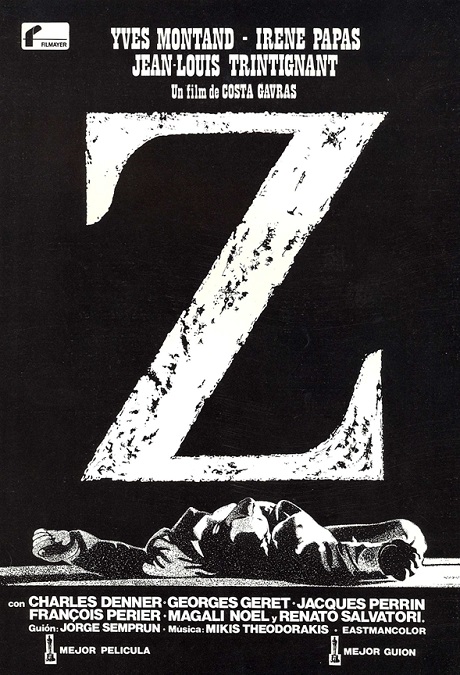
Z – 1969
OK, this is going to be a difficult review to write. It isn’t that it was a tough movie to follow, but because it was a foreign film in a foreign language with foreign actors. I actually liked it well enough. The acting was good and the pace was engaging. It was easy to follow who was who when watching the film, though not by name. That guy is the corrupt General. That guy is the politician who is giving a speech about nuclear disarmament. That lady is his wife.
But it is difficult to call them by name, and when I looked up the cast list on both Wikipedia and IMDB, they give names like Yves Montand as The Deputy, Charles Denner as Manuel, and Gerard Darrieu as Barone. Only by looking up pictures of these obscure French actors on the internet was I able to discern who some of the actors were. For example, Gerard Darrieu was the thug who sold figs and who had beaten the politician’s aid, mistaking him for the politician.
Anyway, the film was about the real-life events that took place in Greece in 1963. Apparently, there was an assassination of a pacifist Deputy, Grigoris Lambrakis, played by Yves Montand, the order of which came from high-ranking officials of the Greek Military Police. My research tells me that the film followed events pretty accurately. In fact, in the opening scene, a statement is displayed on the screen, saying, “Any similarity to real persons and events is not coincidental. It is intentional.” This film wasn’t just made for entertainment. It was an accusation.
Basically, the Greek government viewed Lambrakis as a threat to their power and made arrangements to have him assassinated. They succeeded, but there were just enough questions asked to prompt an official investigation. Suddenly witnesses who might testify against the military started getting attacked or killed, fomenting even more questions and heightening the investigation. Key players like journalists and prosecutors were intimidated and encouraged to drop the case.
But the Examining Magistrate, the main prosecutor, played by Jean-Louis Trintignant, persevered and eventually brought four high-level military officers up on charges of murder. Pierre Dux played The General, the main antagonist behind the assassination. Charged with him was the Colonel, played by Julien Guiomar. Another notable character was the Photojournalist, played by Jaques Perrin. At first I thought he was just a sleazy reporter, but he actually turned out to be an important part of the prosecuting investigation. Marcel Bozzuffi and Renato Salvatori played the parts of Vago, the man who actually murdered the Deputy, and Yago, the driver of the car from which the killing blow was struck.
The only name I recognized from the cast was Irene Papas, playing the part of Helen, Lambrakis’ wife. She didn’t have much screen time, but it was nice to see a familiar face and she did a good job, bring some emotional content to an otherwise dry film. Sure, it was a dramatization of real events, but it was told with very little emotion other than political anger and indignation.
But despite the success of the prosecuting attorneys, the film, which remained true to what actually happened, ended on a pretty depressing note. I can sum it up best by quoting from the plot synopsis given on Wikipedia: “Instead of the expected outcome, the prosecutor is mysteriously removed from the case, several key witnesses die under suspicious circumstances, the assassins receive (relatively) short sentences, the officers receive only administrative reprimands, the Deputy’s close associates die or are deported, and the photojournalist is sent to prison for disclosing official documents.
The heads of the government resign after public disapproval, but before elections are carried out, a Coup d’etat occurs and the military seize all the power. They ban modern art and popular art in its many features such as popular music and avant-garde novelists, as well as modern mathematics, classic and modern philosophers, and the use of the term ‘Z’, (which was used by protesters against the former government), which referred to the Deputy and means: ‘He lives’.”








